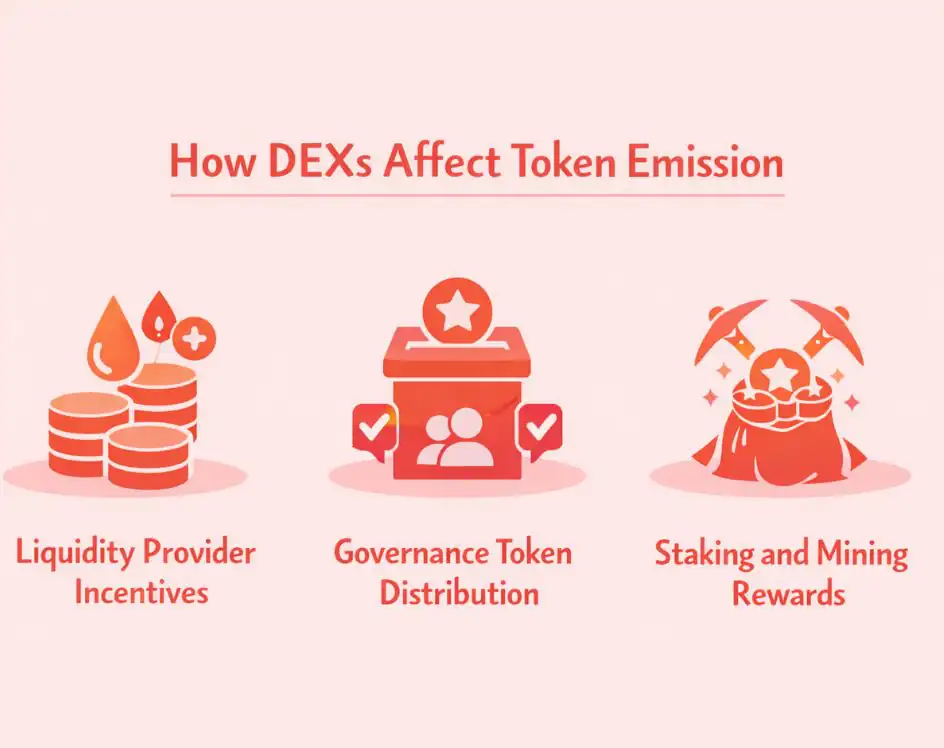Decentralized Exchanges (DEXs) have revolutionized digital asset trading by providing trustless, decentralized environments for cryptocurrency transactions. In the context of DEXs, token emission significantly impacts liquidity, trading dynamics, and overall platform stability. Effective management of token emission is vital for maintaining balanced and functional trading ecosystems. This guide explores the key factors affecting token emission in DEXs, examining how tokenomics, governance, technology, and partnerships influence token supply and distribution strategies in decentralized finance (DeFi) platforms.
Key Takeaways
- Token Emission Definition: The process of creating and distributing new tokens within DEX ecosystems to incentivize liquidity, governance, and platform growth.
- Liquidity Impact: Token emission directly affects liquidity provider rewards, ensuring sufficient trading pool depth for smooth operations.
- Emission Schedules: Fixed vs dynamic emission strategies determine how tokens enter circulation over time, affecting inflationary pressure.
- Governance Integration: Emission often includes governance tokens giving holders voting power on protocol changes and token distribution decisions.
- Technology Influence: Platform upgrades can optimize emission mechanisms, enabling more precise and flexible distribution strategies.
- Security Considerations: Secure emission processes protect against vulnerabilities and ensure fair, intended token distribution.
- Partnership Effects: Collaborations can expand emission use cases and create new incentive programs for users.
What is Token Emission in DEXs?
Token emission in decentralized exchanges (DEXs) refers to creating and distributing new cryptocurrency tokens within trading platform ecosystems. This mechanism serves crucial functions including incentivizing liquidity providers, funding development, and rewarding active users participating in platform activities.[1]
Token emission typically involves issuing tokens serving multiple purposes within decentralized exchange contexts. These tokens might reward users providing liquidity to trading pools, enable participation in governance decisions, or facilitate staking activities. Understanding token emission is essential for anyone looking to create crypto token projects or build sustainable DeFi platforms.
The token emission rate determines how quickly new tokens enter circulation, directly impacting token supply dynamics and value preservation. Well-designed emission schedules balance incentive needs with sustainable tokenomics, preventing excessive inflation while maintaining sufficient rewards for ecosystem participants.
How DEXs Affect Token Emission
Decentralized exchanges significantly impact token emission due to unique mechanisms for distributing and utilizing tokens. In DEXs, token emission can be influenced by several factors including liquidity provider incentives, governance facilitation, and platform stability requirements.

Liquidity Provider Incentives
Many DEXs utilize emission schedules where new tokens are periodically released to liquidity providers contributing to trading pools. This ensures sufficient liquidity for trading activities—essential for smooth exchange operations. Token development solutions must carefully calibrate these emission rates to attract liquidity without creating unsustainable inflationary pressure.
Governance Token Distribution
DEXs often emit governance tokens giving holders voting power on protocol decisions. This decentralized governance model requires thoughtful emission strategies ensuring broad token distribution while maintaining meaningful voting participation. Proper governance token emission aligns user incentives with long-term platform success.
Staking and Mining Rewards
Staking mechanisms provide another emission avenue where users lock tokens to earn rewards. These programs help reduce circulating supply while incentivizing long-term holding behavior. Mining and staking emission rates must balance reward attractiveness with token value preservation goals.
Key Factors Affecting Token Emission in DEXs
Multiple factors influence how DEXs design and implement token emission strategies. Understanding these factors is crucial for blockchain projects and cryptocurrency development teams building sustainable DeFi platforms.
| Security Aspect | Risk | Mitigation Strategy |
|---|---|---|
| Smart Contract Vulnerabilities | Exploits draining emission reserves | Multiple audits, formal verification, bug bounties |
| Admin Key Compromise | Unauthorized emission changes | Multi-sig wallets, timelocks, decentralized governance |
| Sybil Attacks | Fake accounts claiming emission rewards | Identity verification, stake requirements, monitoring |
| Flash Loan Manipulation | Gaming emission distribution | Time-weighted calculations, snapshot mechanisms |
Fixed vs Dynamic Emission Strategies
Token emission schedules typically follow either fixed or dynamic approaches. Fixed emission releases predetermined token amounts at set intervals, providing predictability but lacking flexibility. Dynamic emission adjusts rates based on market conditions, liquidity levels, or governance decisions, offering adaptability but introducing complexity.
Sustainable tokenomics often combine both approaches—establishing base emission rates with adjustment mechanisms responding to ecosystem needs. This hybrid model supports stable development while maintaining responsiveness to changing market conditions.
Importance of Token Emission in DEX Markets
Token emission serves multiple critical functions within DEX ecosystems, directly impacting platform success and user engagement.
Incentivizing Liquidity Providers
Token emission rewards users contributing liquidity to trading pools, ensuring DEXs maintain sufficient depth for smooth trading operations. Token emission for DeFi provides these incentives; without them, exchanges face slippage issues and poor user experiences that drive traders to competing platforms.
Enhancing User Engagement
Token distribution encourages active participation including voting, staking, and community involvement. This engagement helps build vibrant communities around platforms, essential for long-term success. Crypto token development strategies must consider how emission drives user behavior and platform adoption.
Supporting Platform Growth
Token emission allows DEXs to fund development and expansion efforts, improving platform features and capabilities. Treasury allocations from emission support ongoing development, security audits, and ecosystem grants that strengthen overall platform competitiveness.
Effective emission strategies balance token supply and demand, preventing excessive inflation while maintaining incentive attractiveness. Integration with token burning mechanisms can offset emission inflation, creating sustainable economic models preserving long-term token value.
Technology Upgrades and Token Emission
Technology upgrades significantly impact token emission by enhancing DEX efficiency and functionality. Upgrades often improve transaction processing speeds, smart contract capabilities, and overall platform scalability—all affecting emission strategy optimization.[2]
Advanced technology enables more sophisticated reward systems, better token supply management, and enhanced user experiences. For token development teams, these advancements allow more precise and flexible distribution mechanisms responding to real-time ecosystem conditions.
Smart Contract Improvements
Upgraded smart contracts can implement complex emission logic including time-weighted rewards, performance-based distribution, and automated adjustment mechanisms. These capabilities support more nuanced tokenomics impossible with basic emission contracts.
Layer-2 Integration
Layer-2 scaling solutions reduce transaction costs, enabling micro-rewards and more frequent emission distributions. This technology advancement makes sophisticated emission programs economically viable, improving user engagement and reward distribution efficiency.
Partnerships and Collaborations Impact
Partnerships and collaborations significantly influence token emission strategies and outcomes in DEX ecosystems.

Enhanced Incentive Programs
Collaborations with other projects create new incentive programs where tokens are emitted for participating in joint ventures or using partner services. These expanded emission use cases drive adoption while providing additional value to token holders.
Increased Liquidity Through Partnerships
Partnerships with liquidity providers or other exchanges can increase token emission rewarding liquidity contributions. Strategic collaborations boost liquidity pools and help maintain smooth trading operations across connected platforms.
Expanded Use Cases
Collaborations often lead to targeted token emissions incentivizing engagement with new use cases. Similar to how Token Curated Registry systems use tokens for curation, partnerships can create novel token utility expanding emission justification and value capture opportunities.
Security Considerations for Token Emission
Security considerations are critically relevant for token emission, directly impacting DEX integrity and trustworthiness. Secure emission processes protect against vulnerabilities exploitable by malicious actors, including smart contract flaws or distribution mechanism weaknesses.[3]
For any Crypto Token Development, implementing robust security protocols, conducting thorough audits, and regularly updating systems safeguards against potential attacks. Secure token emission ensures fair distribution as intended, maintaining platform reputation and user trust essential for long-term success.
| Security Aspect | Risk | Mitigation Strategy |
|---|---|---|
| Smart Contract Vulnerabilities | Exploits draining emission reserves | Multiple audits, formal verification, bug bounties |
| Admin Key Compromise | Unauthorized emission changes | Multi-sig wallets, timelocks, decentralized governance |
| Sybil Attacks | Fake accounts claiming emission rewards | Identity verification, stake requirements, monitoring |
| Flash Loan Manipulation | Gaming emission distribution | Time-weighted calculations, snapshot mechanisms |
Best Practices for Sustainable Token Emission
Implementing sustainable token emission requires careful planning and ongoing management aligned with platform objectives and market realities.
Transparent Emission Schedules
Publishing clear emission schedules builds trust with users and investors. Transparency about token supply growth, distribution mechanisms, and adjustment triggers enables informed participation and investment decisions supporting ecosystem stability.
Balanced Incentive Structures
Emission programs should balance immediate incentive needs with long-term sustainability. Overly aggressive emission creates inflationary pressure degrading token value, while insufficient emission fails to attract necessary liquidity and participation. Professional cryptocurrency development company teams understand these dynamics and design accordingly.
Governance Integration
Integrating emission parameters into governance processes enables community oversight and adjustment capabilities. This decentralized approach ensures emission evolves with ecosystem needs while maintaining stakeholder alignment essential for sustainable development.
Regular Review and Adjustment
Token emission strategies require regular review assessing effectiveness against platform goals. Market conditions, competitive landscape, and user behavior changes may necessitate emission adjustments maintaining optimal incentive structures and economic sustainability.[4]
Conclusion
Token emission in DEXs represents a critical mechanism influencing liquidity, user engagement, and platform sustainability across decentralized finance ecosystems. Understanding the factors affecting emission—from liquidity needs and token utility to technology upgrades and partnership opportunities—enables more effective tokenomics design and management.
Successful token emission strategies balance multiple considerations including incentive attractiveness, inflationary pressure management, security requirements, and governance integration. Whether implementing fixed schedules providing predictability or dynamic mechanisms offering flexibility, sustainable emission aligns user incentives with long-term platform development goals.
For blockchain projects and crypto development company teams building DEX platforms, thoughtful emission design proves essential for ecosystem success. By implementing transparent schedules, robust security measures, and community governance, platforms can create sustainable tokenomics supporting growth while preserving token value. As DeFi continues evolving, token emission strategies will remain central to platform competitiveness and user value creation in decentralized exchange ecosystems.
Frequently Asked Questions
Token emission refers to creating and distributing new tokens within DEX ecosystems, typically rewarding liquidity providers, funding platform development, and enabling governance participation through structured distribution schedules.
Token emission increases circulating supply, potentially creating inflationary pressure on price. However, well-designed emission paired with strong utility and burning mechanisms can maintain value by driving demand proportional to supply growth.
Fixed emission releases predetermined token amounts at set intervals, providing predictability. Dynamic emission adjusts rates based on conditions like liquidity levels or governance votes, offering flexibility but increased complexity.
DEXs implement security measures including smart contract audits, time-weighted reward calculations, stake requirements, and monitoring systems detecting suspicious activity patterns attempting to game emission distributions.
Yes, most DEXs include governance mechanisms allowing community votes on emission parameter changes. These typically require proposal processes, voting thresholds, and time lock delays before implementation.
Token burning offsets emission inflation by permanently removing tokens from circulation. Fee burns, buyback programs, and deflationary mechanics help balance token supply, maintaining value despite ongoing emission.
Reviewed & Edited By

Aman Vaths
Founder of Nadcab Labs
Aman Vaths is the Founder & CTO of Nadcab Labs, a global digital engineering company delivering enterprise-grade solutions across AI, Web3, Blockchain, Big Data, Cloud, Cybersecurity, and Modern Application Development. With deep technical leadership and product innovation experience, Aman has positioned Nadcab Labs as one of the most advanced engineering companies driving the next era of intelligent, secure, and scalable software systems. Under his leadership, Nadcab Labs has built 2,000+ global projects across sectors including fintech, banking, healthcare, real estate, logistics, gaming, manufacturing, and next-generation DePIN networks. Aman’s strength lies in architecting high-performance systems, end-to-end platform engineering, and designing enterprise solutions that operate at global scale.






